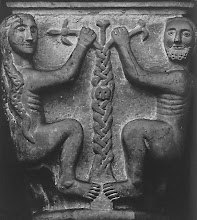(p.72) “Morning Song,” Sylvia Plath
Love set you going like a fat gold watch.
The midwife slapped your footsoles, and your bald cry
Took its place among the elements.
Our voices echo, magnifying your arrival. New statue.
In a drafty museum, your nakedness
Shadows our safety. We stand round blankly as walls.
I’m no more your mother
Than the cloud that distills a mirror to reflect its own slow
Effacement at the wind’s hand.
All night your moth-breath
Flickers among the flat pink roses. I wake to listen:
A far sea moves in my ear.
One cry, and I stumble from bed, cow-heavy and floral
In my Victorian nightgown.
Your mouth open clean as a cat’s. The window square
Whitens and swallows its dull stars. And now you try
Your handful of notes;
The clear vowels rise like balloons.
What I like about this much less exuberant poem is the metaphors she uses to describe this strange, bewildering, and exhausting experience of caring for a new baby. The images (metaphors) don’t work together—they just came flying at you one after another: gold watch, statue in a museum, a cloud above a dewy field, breath like a moth fluttering, the sea, a cow, a cat’s mouth, balloons. That’s kind of how the first days of being a mother felt—strange and disconnected, but experienced with intensity: apparently meaningless details etched in the mind, and everything happening in the present tense.
skip to main |
skip to sidebar


All text (excluding quoted poems and comments) within Matter | Pattern by Emma J is licensed under a Creative Commons Attribution-Noncommercial-Share Alike 3.0 United States License.
living with poetry
"Let our words be as necessary and useful as once were words of magic.
This is an unachievable ideal."
Anna Swir (1909 - 1984)
This is an unachievable ideal."
Anna Swir (1909 - 1984)
. . . . and elsewhere
Matter | Pattern

matter [ME matere, fr. OF matere, matiere, fr. L materia] tree trunk (<"matrix," the tree's source of growth) matter, subject, physical substance, wood for building, fr. mater mother
mother Based ultimately on the baby-talk form ma- 2 [Indo-European ma - 1 <"good" with derivatives meaning "occurring at a good moment, timely, seasonable, early, ripe" ; ma- 2 <"breast" an imitative root derived from the child's cry for the breast, a linguistic near-universal found in many of the world's languages; ma- 3 <"damp ") [ME moder, fr. OE modor, akin to OHG muoter, ON mothir, L mater (maternal, maternity, matriculate, matrix, matron), Gk meter (metro-, metropolis [<"mother city]; Demeter [< "god-mother"], Skt matr]
meter [ME meter, metre, fr. OE & MF, fr. L metrum, fr. Gk metron (<"measure" ) fr. IE root me-] meter, metrical, diameter, geometry, metronome. Suffixed forms mens, men-ot (<"moon, month") an ancient and universal unit of time measured by the moon (menarche, meniscus, menopause, menses, menstrual, bimester, semester, trimester).
poetry [fr. ME poet, poete fr. OF poete, fr. L poeta, fr. Gk poietes, poetes <"maker, composer, poet, fr. poien to make, do , create, compose"] akin to Skt cinoti <"he gathers, heaps up, piles in order," OSlav ciniti <"to arrange, to pile up"
padre from papa, a child's word for "father," a linguistic near-universal found in many languages. [IE root pa- <"to protect, feed" (fodder, forage, pabulum, food, foster, pasture, repast, pastor <"shepherd, protector") (ME fader, fr. OE faeder; akin to OHG fater, ON fathir, Goth fadar, L pater, Jupiter [<"god-father"], patrare [<"to bring about"]; Gk pater, Skt pitr) patrician, patrimony, patron, pater, paternal
pattern [ME patron, fr. MF, fr. L patronus (<"master, pattern") fr. L defender, protector, advocate, fr. patr-, pater (<"father") a fully realized form, original, or model accepted or proposed for imitation, archetype, exemplar.
mother Based ultimately on the baby-talk form ma- 2 [Indo-European ma - 1 <"good" with derivatives meaning "occurring at a good moment, timely, seasonable, early, ripe" ; ma- 2 <"breast" an imitative root derived from the child's cry for the breast, a linguistic near-universal found in many of the world's languages; ma- 3 <"damp ") [ME moder, fr. OE modor, akin to OHG muoter, ON mothir, L mater (maternal, maternity, matriculate, matrix, matron), Gk meter (metro-, metropolis [<"mother city]; Demeter [< "god-mother"], Skt matr]
meter [ME meter, metre, fr. OE & MF, fr. L metrum, fr. Gk metron (<"measure" ) fr. IE root me-] meter, metrical, diameter, geometry, metronome. Suffixed forms mens, men-ot (<"moon, month") an ancient and universal unit of time measured by the moon (menarche, meniscus, menopause, menses, menstrual, bimester, semester, trimester).
poetry [fr. ME poet, poete fr. OF poete, fr. L poeta, fr. Gk poietes, poetes <"maker, composer, poet, fr. poien to make, do , create, compose"] akin to Skt cinoti <"he gathers, heaps up, piles in order," OSlav ciniti <"to arrange, to pile up"
padre from papa, a child's word for "father," a linguistic near-universal found in many languages. [IE root pa- <"to protect, feed" (fodder, forage, pabulum, food, foster, pasture, repast, pastor <"shepherd, protector") (ME fader, fr. OE faeder; akin to OHG fater, ON fathir, Goth fadar, L pater, Jupiter [<"god-father"], patrare [<"to bring about"]; Gk pater, Skt pitr) patrician, patrimony, patron, pater, paternal
pattern [ME patron, fr. MF, fr. L patronus (<"master, pattern") fr. L defender, protector, advocate, fr. patr-, pater (<"father") a fully realized form, original, or model accepted or proposed for imitation, archetype, exemplar.
Blog Archive
-
▼
2007
(31)
-
▼
November
(25)
- “Winter Verse for His Sister,” by William Meredith
- from "Three Poems for a Twenty-Fifth Anniversary,"...
- “Sent to Her Elder Daughter from the Capital,” by ...
- “September, the First Day of School, #1,” by Howar...
- “For a Five-Year-Old,” by Fleur Adcock
- “Night Terrors,” by Alan Shapiro
- “Instinct,” by C.K. Williams
- "To my Daughter" by Stephen Spender
- "A Cradle Song" by W.B. Yeats
- "The Tempest - to my daughter Miranda" by Stephen ...
- "Morning Song" by Sylvia Plath
- "Five a.m., the Ninth Month" by Jacqueline Osherow
- "After Midnight, the Fifth Month" by Jacqueline Os...
- "Infertility" by Edward Hirsch
- "My Husband before Leaving" translated by J. Mouss...
- "Lesson" by Forrest Hamer
- "Letter of Recommendation" by Yehuda Amichai
- "Those Winter Sundays" by Robert Hayden
- "I Ask my Mother to Sing" by Li-Young Lee
- "Clearances" by Seamus Heaney
- "Portrait of my Mother on Her Wedding Day" by Celi...
- "The Journey," by David Ignatow
- "Nikki-Rosa," by Nikki Giovanni
- A Poem a Day for 30 Days: #1“There Was a Child Wen...
- Where I'm Coming From: Biases and Blindspots
-
▼
November
(25)
I am

All text (excluding quoted poems and comments) within Matter | Pattern by Emma J is licensed under a Creative Commons Attribution-Noncommercial-Share Alike 3.0 United States License.

